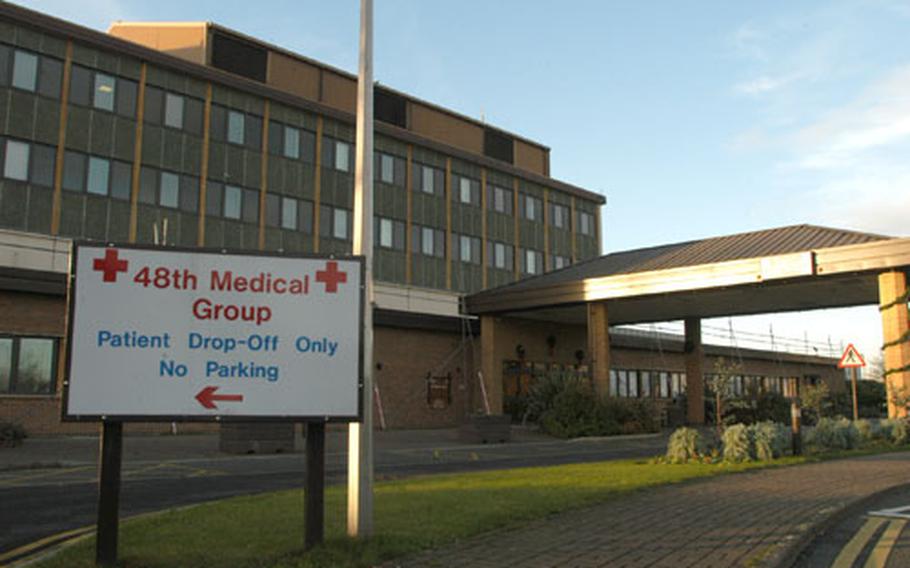
The 48th Medical Group hospital. (Bryan Mitchell / Stars and Stripes)
RAF LAKENHEATH — The 48th Medical Group hospital is in the midst of a massive renovation project that promises to bring the facility up to contemporary American standards. But there are going to be some growing pains along the way.
Medical sections ranging from physical therapy to optometry will be affected by the $11 million renovation, but patients most affected will be pregnant women who may have to deliver at a British hospital.
The labor-and-delivery section soon will lose 25 percent of its bed capacity as work gets under way in April to convert the current allotment of 14 double rooms to 11 single rooms, according to the 48th Medical Support Squadron commander, Lt. Col. Rex Langston, 49, of Moses Lake, Wash.
The renovated rooms will provide families with hitherto unavailable privacy, Langston said.
The new 350-square-foot rooms will be equipped with comfortable furniture and a bassinet, which means the current nursery will be supplanted by a much smaller one. The renovation is slated to take five months.
“It’s lock step with what the civilian sector is doing,” Langston said. “It’s thought to be better for the mom, better for the baby and better for the dad, too.”
The RAF Lakenheath labor-and-delivery section is the busiest in U.S. Air Forces in Europe, delivering about 511 babies last year. That’s compared to an estimated 199 at the Spangdahlem/Bitburg hospital and 178 at the Aviano Air Base hospital in 2007, according to USAFE.
The Air Force community first learned of the move in a Dec. 4, 2007, letter from the obstetrics and gynecology flight commander, Lt. Col. Kathryn F. Tate.
“The OB clinic must decrease the enrolled pregnant population during the time of the construction; otherwise there is a high potential to divert patients to the NHS unexpectedly during labor,” the letter states. “Currently our enrolled patients exceed our labor bed capacity by 15 percent.”
While the approximately $2 million construction project is under way, the labor-and-delivery section will have 10 rooms, Langston said. That equates to a diminished capacity that will leave certain patients looking to Britain’s National Health Service.
Those most likely to be affected are civilian employees and contractors who serve at so-called geographically separated units such as RAFs Croughton, Fairford, Alconbury and Menwith Hill as well as retirees, Langston said.
“All of the active duty have to deliver here by Air Force instruction, but other people will most likely have to be transferred onto the NHS,” Langston said. “We will not be able to see some of the people.”
Langston acknowledged consternation from families about the possibility of not being able to deliver their baby in an American hospital.
“There has been some concern, but we’ve tried to educate our people. We’ve been in touch with the GSUs to fill them in,” he said. “But, frankly, OB (obstetrics) care on the economy is pretty darn good.”
Langston noted that all high-risk pregnancies will be transferred to Addenbrooke’s Hospital in Cambridge, which is the case regardless of the renovation.
A set of new parents said the renovation has positives and negatives. Shelby and Sarah Burnett spoke to Stars and Stripes less than eight hours after they welcomed 7-pound, 11-ounce Rachel Madison into their lives.
“I think it will be good, being able to keep the baby in the room with you and when one baby starts crying they can wake the other one up, so that privacy will be nice,” said Shelby Burnett, a 28-year-old Air Force Office of Special Investigations special agent from Antlers, Okla.
But Sarah Burnett said there is a benefit to the shared rooms.
“The mothers can share stories and the families that come in can get to know each other,” the 29-year-old Cumberland, Md., native said.
Both, however, said the thought of delivering Rachel Madison off-base was not welcome.
“We’ve seen doctors here, we know the doctors here and they have our records here,” Shelby Burnett said. “We just feel comfortable here.”